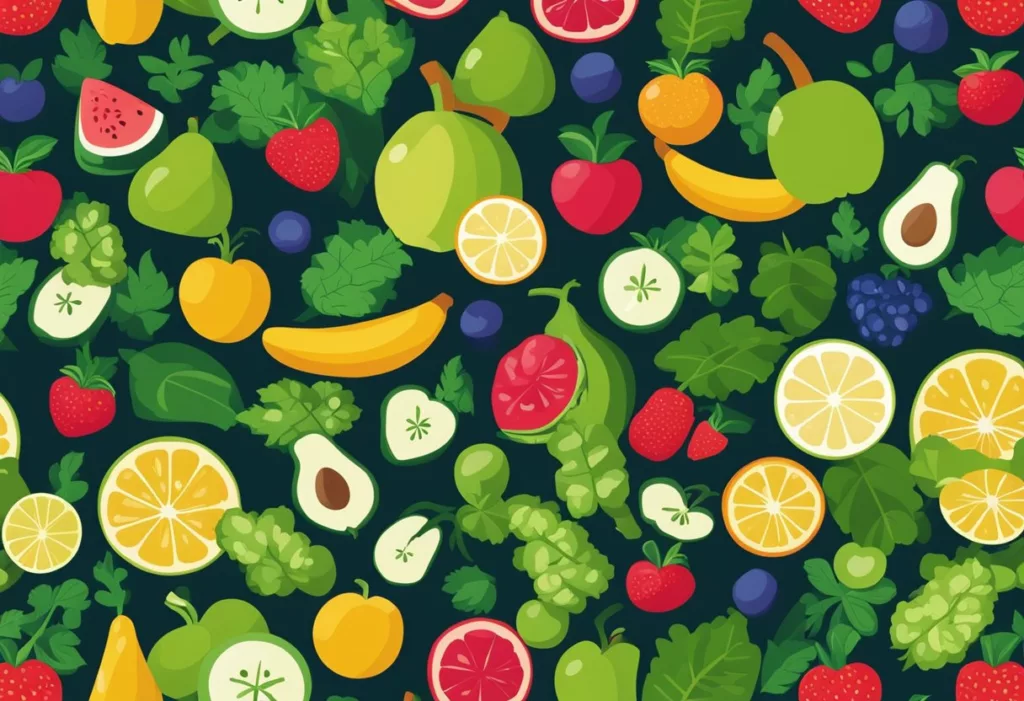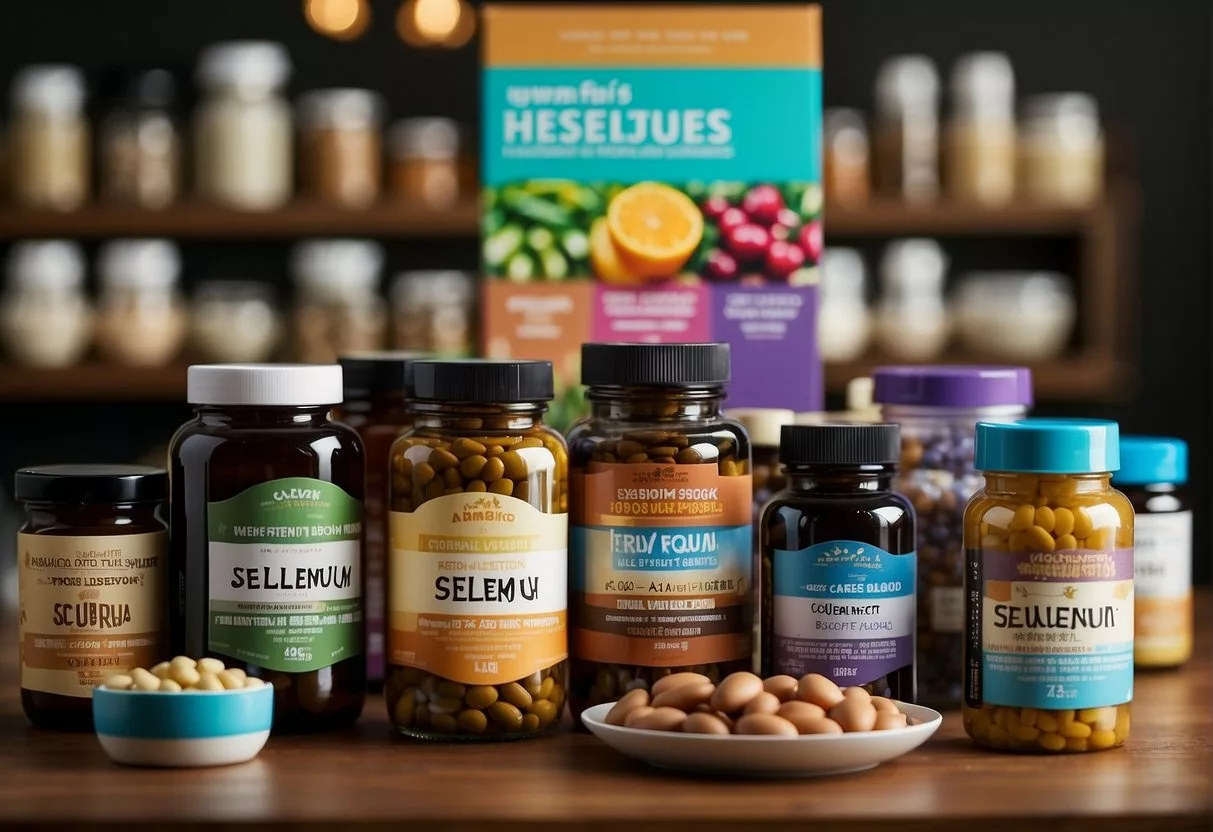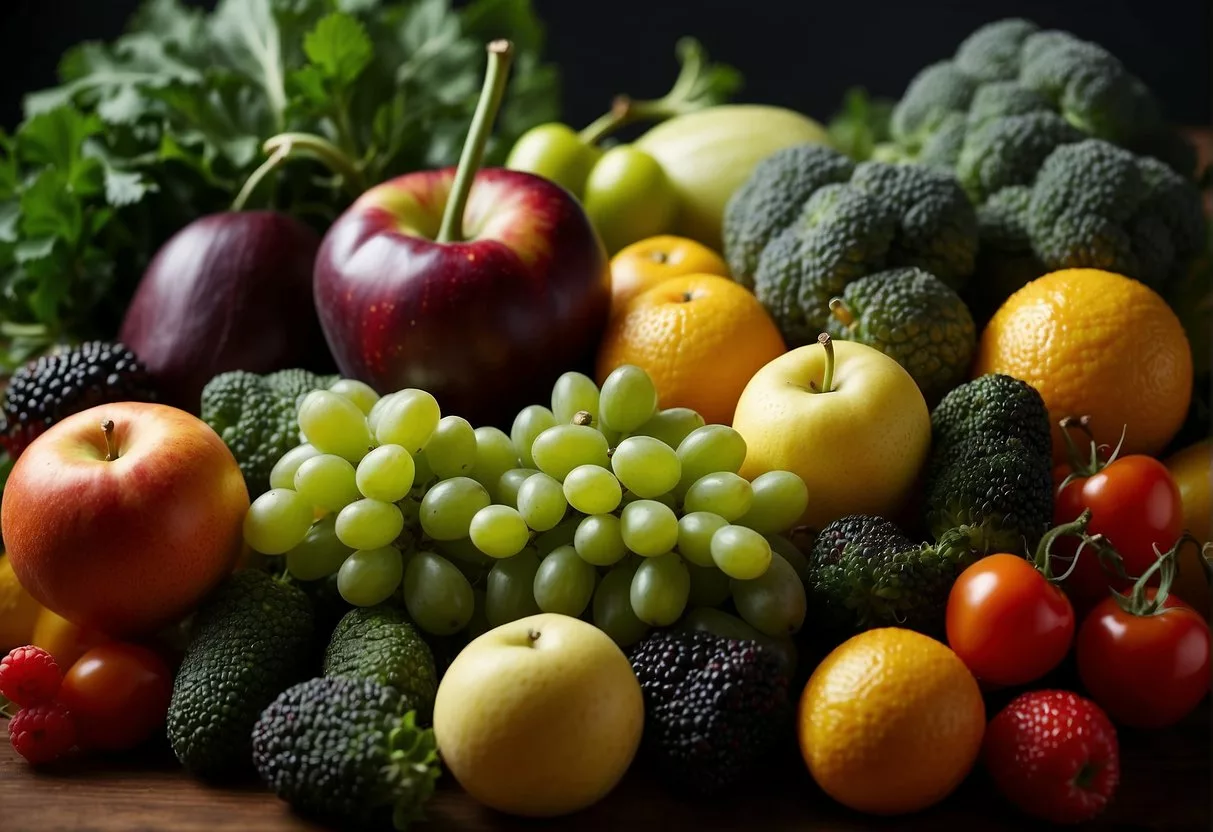Selenium is an essential trace mineral that serves multiple key roles in the human body. Known primarily for its antioxidant properties, selenium is touted for its ability to combat oxidative stress and support overall cellular health. Despite being required in small amounts, its impact on our wellbeing is significant. I understand that maintaining the right balance of selenium can support thyroid function, boost immune response, and might even play a role in heart health.

As a trace element found in various foods and sometimes added to dietary supplements, selenium’s contributions to health are well-documented. It has a symbiotic relationship with vitamins and other minerals within the body, often enhancing their effects.
For instance, selenium works in conjunction with vitamin E to protect cells from damage. Another critical function I recognize in selenium is its role in the production of thyroid hormones, which are crucial for regulating metabolism and ensuring normal growth and development. With a variety of sources available, from Brazil nuts to whole grains, incorporating selenium into a balanced diet can be effortlessly achieved.
Key Takeaways
- Selenium’s antioxidant properties offer cellular protection.
- Proper selenium levels are vital for thyroid health and immune function.
- A balanced diet typically provides the necessary selenium intake.
Selenium Fundamentals

In this section, I will discuss selenium, a crucial mineral for human health, including what it is, its importance in your diet, and the diverse sources you can obtain it from.
What Is Selenium?
Selenium is a trace element that is vital for proper body function. Though required only in small amounts, it plays a key role in metabolism and thyroid function and helps protect your body from damage caused by oxidative stress. My body uses this mineral in the synthesis of certain proteins called selenoproteins, which are essential for reproduction, DNA production, and thyroid gland function.
Essential Mineral for Health
Selenium is integral for the antioxidant activities of my body, as it boosts the body’s defenses against bacteria and viruses. It’s also important for reproductive health and plays a role in preventing cell damage and infections. There’s evidence to suggest its contribution to preventing heart disease and even some types of cancer. Due to its importance in immune system support, not getting enough selenium could mean my body might not respond to infections as effectively.
Sources of Selenium
Getting enough selenium in my diet is essential, and it can be found in a variety of foods. Here’s a quick list of selenium-rich foods in my diet:
- Nuts, especially Brazil nuts: Just one Brazil nut can provide more than the daily recommended amount of selenium.
- Seafood: Foods like tuna, halibut, sardines, and shrimp are excellent sources.
- Meats: Beef, liver, turkey, and chicken have high selenium content.
- Eggs: They’re a good way to add selenium to my diet.
- Mushrooms: For vegetarians or vegans, mushrooms can be a beneficial source.
- Cereals and Grains: Including bread, rice, and fortified cereals.
For those following a vegetarian or vegan lifestyle, options like cereals, bread, rice, eggs (if pescatarian or ovo-vegetarian), and mushrooms ensure adequate selenium intake. Fish, while a rich source, is not suitable for vegetarians or vegans but provides a robust amount for pescatarians. It’s crucial to note that the amount of selenium in plant-based foods varies depending on the selenium content of the soil where they’re grown.
Health Benefits of Selenium

Selenium is an essential mineral that plays a crucial role in maintaining our health. I understand its importance for thyroid health, its antioxidant capabilities, support for the immune system, and potential influence on heart disease.
Thyroid Function and Health
My thyroid gland relies on selenium to function properly. This trace element is vital for the production of thyroid hormones, which regulate metabolism and energy use in my body. A selenium deficiency can lead to issues such as autoimmune thyroiditis, where the immune system mistakenly attacks the thyroid gland.
Antioxidant Properties
Selenium acts as a powerful antioxidant, helping to reduce oxidative stress by neutralizing free radicals in my body. This can prevent cell damage and is linked to a reduced risk of chronic diseases, including some forms of cancer and cognitive decline.
Immune System Support
Selenium is key for a robust immune system. It helps to bolster my immune defense, which may protect me against pathogens and reduce the severity of some viral infections, like HIV, by enhancing immune function.
Influence on Heart Disease
Some studies have noted that selenium may have a cardio-protective effect. By reducing inflammation and oxidative stress, selenium may help to lower the risk of heart disease and maintain overall cardiovascular health.
Selenium in Disease Prevention

Selenium, a trace mineral found in a variety of foods, plays a vital role in the prevention of several diseases. Its antioxidant properties and involvement in immune system function contribute to its protective effects against various health conditions.
Role in Cancer Prevention
Research suggests that selenium may help reduce the risk of certain cancers. My capacity to support the immune system is thought to be central here, as my antioxidant actions help in minimizing oxidative stress and cellular damage — well-known factors in cancer development. For instance, its role in prostate cancer prevention has drawn scientific interest due to observed correlations between adequate selenium intake and a reduced risk of prostate cancer incidence.
Protection Against Heart Conditions
As it pertains to the heart, my benefits extend to potentially safeguarding against cardiovascular disease. My contributions include defending against oxidative modification of lipids and tissues, a key factor in the development of cardiovascular diseases like heart attack. Moreover, selenium deficiency has been linked to heart conditions such as Keshan disease, reinforcing the significance of maintaining an adequate selenium status for heart health.
Thyroid Disease Management
In terms of thyroid health, I am critical because the thyroid gland contains a high concentration of selenium. This makes it essential for the metabolism of thyroid hormones and protecting the gland from oxidative stress, which can lead to thyroid conditions. A proper balance of selenium is necessary for maintaining thyroid function and a deficiency in me might contribute to thyroid disorders.
Risks and Considerations

While selenium is an essential trace mineral for my health, it’s important for me to be aware of the potential risks and considerations associated with its intake. I need to balance my intake to avoid selenium toxicity while preventing selenium deficiency and understand the appropriate dosage.
Selenium Toxicity and Side Effects
Selenium toxicity, also known as selenosis, can occur when I consume too much selenium. The symptoms of selenium toxicity can include nausea, hair loss, and in severe cases, kidney failure. Selenium supplements, if taken in high doses, can contribute to these adverse effects. The tolerable upper intake level for selenium is 400 micrograms per day for adults, including pregnant and lactating women, and exceeding this amount might increase my risk of toxicity.
Selenium Deficiency
On the flip side, selenium deficiency is rare but can lead to health problems, including a higher susceptibility to certain types of infection. It’s typically seen in regions with selenium-deficient soils, where the food grown does not provide enough of this essential mineral. A selenium deficiency in my diet can have implications for my thyroid function and overall health.
Appropriate Dosage and Intake
Determining the right amount of selenium can be a nuanced task. For most adults, the recommended daily allowance (DV) is 55 micrograms, which I can usually meet through a balanced diet. Supplementation should be approached with caution, as selenium is readily available in many foods, and the margin between the necessary intake and toxicity is relatively small. I should consult with a healthcare provider before starting any supplements, particularly if I’m considering a dosage near the upper limit.
Selenium in Special Populations
The intake and benefits of selenium can vary significantly across different groups. Each subgroup—pregnant and lactating women, adults and the elderly, vegetarians and vegans—has distinct selenium requirements influenced by their unique dietary needs.
Selenium for Pregnant and Lactating Women
Pregnant and lactating women require increased selenium to support the growth and development of the fetus and meet the nutritional demands of breastfeeding. The recommended daily intake may be higher for pregnant women to aid in the protection against oxidative stress and support the immune system. Selenium-enriched foods such as Brazil nuts, whole grains, and seafood can be beneficial additions to the diet of expectant and new mothers.
Selenium Needs in Adults and Elderly
As adults age, their selenium needs can be impacted by a variety of factors including changes in metabolism and potential for chronic diseases. To maintain a healthy immune system and support thyroid function, adults—and particularly the elderly—should ensure they are consuming foods rich in selenium. This might include meat, fish, eggs, and dairy products, which are typically high in this vital nutrient.
Considerations for Vegetarians and Vegans
Vegetarians and vegans may need to pay special attention to their selenium intake, as plant-based diets can sometimes lack sufficient quantities of this nutrient. It’s essential to include selenium-rich plant foods like sunflower seeds, mushrooms, and whole wheat bread. For this demographic, periodic monitoring of selenium levels might be necessary to ensure dietary needs are met, and supplementation could be considered if dietary sources are inadequate.
Practical Tips for Selenium Intake

Selenium is a crucial nutrient for maintaining overall health, and my focus in this section is to guide you through its dietary inclusion and supplementation.
Incorporating Selenium into the Diet
To ensure you get enough selenium, integrating it into your daily diet is essential. Brazil nuts are the richest food source of selenium; just one nut can provide a substantial dose. However, it’s important to consume them in moderation due to their high selenium content.
Diverse Dietary Sources:
- Nuts and Seeds: Primarily, Brazil nuts but also sunflower seeds
- Seafood: Tuna, halibut, and yellowfin tuna offer good amounts
- Meats: Beef, chicken, and lamb are beneficial sources
- Eggs and Dairy: Including foods like cottage cheese
- Vegetarian Options: Foods such as mushrooms, lentils, and cereals
Sample Daily Diet Plan:
| Meal | Selenium-Rich Food Item |
|---|---|
| Breakfast | Scrambled eggs with mushrooms |
| Lunch | Chicken salad with mixed greens |
| Snack | A single Brazil nut |
| Dinner | Grilled halibut with a side of lentils |
By incorporating a variety of these foods, you also receive additional nutrients beyond selenium which are vital for a balanced diet.
Making Informed Choices on Supplements
When diet alone isn’t enough or for those with specific health needs that require a higher selenium intake, supplements can play a role. It’s crucial to opt for high-quality supplements and not to exceed the recommended daily intake to prevent toxicity.
Key Points for Supplements:
- Assess Diet First: Analyze your dietary intake of selenium before considering supplementation.
- Quality Matters: Choose supplements from reputable brands to ensure safety and efficacy.
- Dosage: Generally, 55 micrograms per day for adults is recommended, but it’s best to consult with a healthcare provider.
- Frequency: A daily multivitamin or dedicated selenium supplement can help meet intake goals.
Remember, food sources like meat, seafood, eggs, and certain nuts and beans are typically preferred over supplements for nutrient absorption and overall nutrition balance. Supplements should complement, not replace, a healthful diet.
Frequently Asked Questions

In this section, I’ll address some common inquiries about the various health aspects influenced by selenium.
What are the potential health benefits of selenium for men?
Selenium is crucial for male fertility as it contributes to the development and motility of sperm. It also plays a role in protecting cells from oxidative stress, which is vital for maintaining overall health.
How does selenium contribute to skin health?
As an antioxidant, selenium helps to protect the skin from environmental damage and may slow down the aging process by preserving tissue elasticity.
Can selenium intake affect sexual health, and if so, how?
Selenium intake is linked to sexual health through its role in sperm production and motility. Adequate levels of selenium are essential for optimal male sexual health.
What role does selenium play in women’s health?
For women, selenium is important for reproductive health and may play a role in preventing certain types of cancer, thanks to its antioxidant properties.
Are there any specific benefits of combining zinc with selenium?
Combining zinc with selenium can enhance the function of the immune system and may provide a synergistic effect in supporting male reproductive health.
How can selenium impact hair health?
Selenium helps in the maintenance of hair health by aiding growth and protecting against free radical damage that can lead to hair loss.